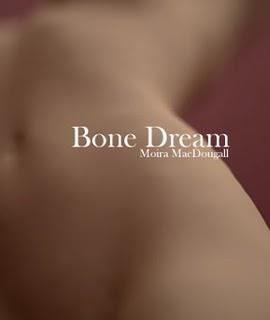Bone Dream

After an encounter with the divine, even dreams must seem mundane and tiny, despite their distance from everyday reality. "After Cupid, Psyche begins to grind/the left-over mice bones of her dreams." These two lines, with which Moira MacDougall begins the first poem of Bone Dream, illustrate the central dilemma of the collection, which is also the origin of its power: that extraordinary experiences may also be ordinary.
In many of MacDougall's poems, this paradox appears most clearly in the final turn. The little girl who narrates "Hope" expresses in the last two lines the desire that her father would love her "as much as he loved his god." On one level, this is the ordinary wish of a young girl to be the center of her father's world. On another, it is an astounding aspiration: to be, in some respect, like a deity. "Sky" is more subtle. The tale of a family's typical summer outing ends with a camera "framing shadows." It is as though their bodies have disappeared, which is both wondrous and eerie.
MacDougall does not always wait until the conclusion of a poem to weave the unusual into the usual. In "Double Vision" the first stanza introduces the image of elbows-as-eyes. Because it is said in the voice of the little girl and a simile is used, this transformation of body parts comes across as merely the product of a clever child's imagination. The second stanza develops it more and drops the "as if" so that it comes to seem literal. The ordinary leads into the extraordinary.
Similarly, a sequence dealing with ballet makes the ethereal dance form a matter of bodies, especially bodies painfully disciplined. The first of these poems focuses on a dance teacher's gnarled feet. The last compares learning to wear pointe shoes and the other accoutrements of a ballerina with ritual embalming, thus adding spirituality while further emphasizing the body.
Despite the skill with which she brings together the ordinary and the extraordinary, MacDougall stumbles when writing about people unlike herself. She describes, briefly, the life and death of a dwarf in "Small Bones," but does so through the her own eyes and the eyes of others around him, as though this individual's subjectivity were less important than how others felt about him. He is treated not as a person, but as a symbol whose tiny skeleton echoes similar images in other poems.
Further along, in "Rituals of Healing," she writes, "A rabid, vegan idealist loses his right arm to the hijinks/of his adolescent daughter playing with a forbidden firearm/All that intellectual integrity shredded, then withered." She creates a stereotypical character in order to subject him to a supposedly ironic fate.
Still, Bone Dream remains a strong meditation on the connection between the usual and the strange, the embodied and the physical. Moira MacDougall has found a distinct way to explore a life in all its strangeness and familiarity.
Cross-posted with Gender Across Borders